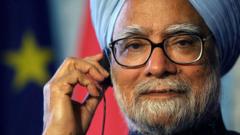Manmohan Singh, who served as India's prime minister for two terms, is remembered as a gentle yet resolute leader who navigated political intricacies and economic reforms. His calm demeanor, pivotal in transforming India's economy, coexisted with challenges marked by corruption allegations and national tragedies. His legacy, though complicated, resonates with many who viewed him as a kind and principled figure.
Remembering Manmohan Singh: A Quiet Leader with a Steely Resolve

Remembering Manmohan Singh: A Quiet Leader with a Steely Resolve
The legacy of India's former prime minister, Manmohan Singh, highlights the incredible impact of his leadership amid challenges and controversies.
Manmohan Singh, India's former prime minister, passed away recently, prompting reflections on his legacy as a resilient yet gentle leader. Tributes are pouring in, as Singh is celebrated for his quiet strength and significant contributions to Indian history. The government has announced a seven-day mourning period, with a state funeral scheduled for Saturday.
Well known for his humble demeanor, Singh's career spanned pivotal positions, including governor of the Reserve Bank of India and finance minister, before he ascended as prime minister. Despite his high-profile roles, he lacked the typical charisma of many politicians, often opting for silence during controversies involving his administration.
Singh's leadership during a period of rapid economic growth earned him admiration. His pragmatic approach was characterized by careful decision-making and a reluctance to engage in unnecessary disputes. Supporters heralded his as a leader of integrity, while critics accused him of indecisiveness. His trademark soft-spoken nature, often the subject of mockery, was endearing to many, differentiating him from the often bombastic nature of political discourse.
Despite his low-profile style, Singh's dignified handling of challenging circumstances left an indelible mark. Born in what is now Pakistan, he rose from humble beginnings to hold the unique distinction of being India's first Sikh prime minister. His educated background—a product of Cambridge and Oxford—combined with his reputation for honesty, endeared him to the nation’s middle class.
A significant moment in his tenure came in 2005 when he publicly apologized for the 1984 anti-Sikh riots, a courageous act that garnered respect across party lines and signified his commitment to healing historical wounds.
Singh also faced immense scrutiny during his premiership, particularly regarding his relationship with the Gandhi family, often portrayed as subordinate to their leadership. His major accomplishments included the landmark nuclear deal with the United States in 2008, which raised his profile globally, but also exposed him to criticism.
Singh's government faced tumultuous political waves, particularly during and after the 2008 Mumbai terror attacks, where the opposition accused his administration of a flawed response to terrorism. His efforts to alleviate tension with Pakistan were overshadowed by ensuing violence.
In the face of escalating corruption allegations during his second term, Singh's once-stalwart image began to wane. His reaction to the anti-corruption movement led by activist Anna Hazare further alienated segments of the populace that previously admired him. Similarly, his delayed response to a high-profile gang rape case in Delhi drew widespread rebuke.
Ultimately, Singh announced his decision not to seek a third term in 2014, asserting that history would provide a more favorable assessment of his leadership than contemporary politics. Although he and the Congress party suffered a significant electoral defeat afterward, Singh's legacy endures as that of an introspective leader committed to India's middle class and underprivileged.
His tenure may have been marred by political strife and economic challenges, but Singh's legacy as a kind and determined leader, marked by personal integrity and a focus on fostering peace remains firmly entrenched in India's political narrative.





















